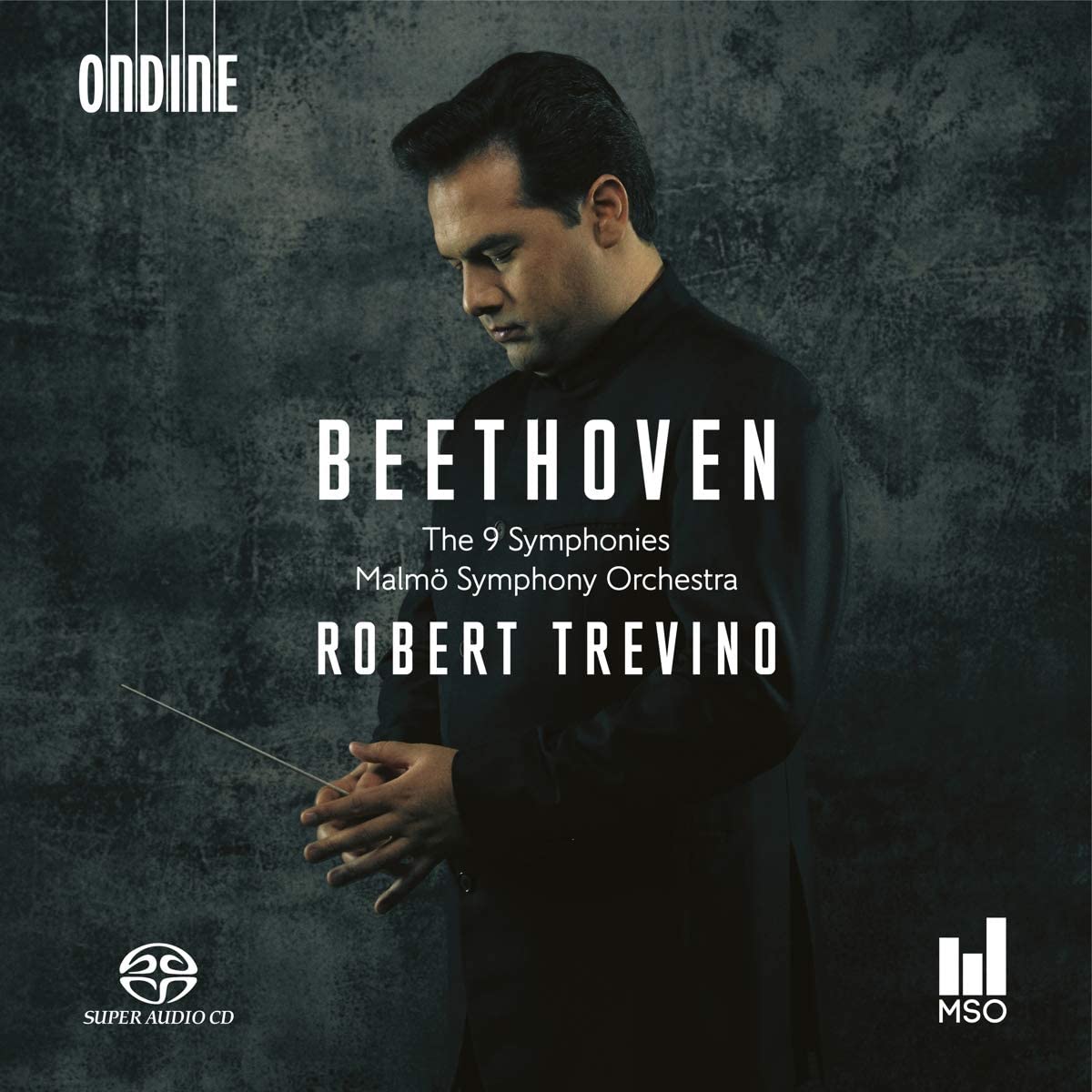BEETHOVEN Symphonies (Trevino)
View record and artist detailsRecord and Artist Details
Genre:
Orchestral
Label: Ondine
Magazine Review Date: 08/2020
Media Format: Super Audio CD
Media Runtime: 305
Mastering:
DDD
Catalogue Number: ODE1348-5Q

Tracks:
| Composition | Artist Credit |
|---|---|
| Symphony No. 1 |
Ludwig van Beethoven, Composer
Malmö Symphony Orchestra Robert Trevino, Conductor |
| Symphony No. 2 |
Ludwig van Beethoven, Composer
Malmö Symphony Orchestra Robert Trevino, Conductor |
| Symphony No. 3, 'Eroica' |
Ludwig van Beethoven, Composer
Malmö Symphony Orchestra Robert Trevino, Conductor |
| Symphony No. 4 |
Ludwig van Beethoven, Composer
Malmö Symphony Orchestra Robert Trevino, Conductor |
| Symphony No. 5 |
Ludwig van Beethoven, Composer
Malmö Symphony Orchestra Robert Trevino, Conductor |
| Symphony No. 6, 'Pastoral' |
Ludwig van Beethoven, Composer
Malmö Symphony Orchestra Robert Trevino, Conductor |
| Symphony No. 7 |
Ludwig van Beethoven, Composer
Malmö Symphony Orchestra Robert Trevino, Conductor |
| Symphony No. 8 |
Ludwig van Beethoven, Composer
Malmö Symphony Orchestra Robert Trevino, Conductor |
| Symphony No. 9, 'Choral' |
Ludwig van Beethoven, Composer
Christine Rice, Mezzo soprano Derek Welton, Bass Kate Royal, Soprano Malmö Symphony Chorus Malmö Symphony Orchestra Robert Trevino, Conductor Tuomas Katajala, Tenor |
Author: Peter Quantrill
Recorded live, it says on the back of the box, and you can tell: not by the concluding applause, which has presumably been edited out, or by telltale slips – if there were any, they have been patched – but by the unpredictable loss of momentum here and there. Halfway through the Pastoral’s finale, for instance, and at the crucial transition points from slow introduction to Allegro in the opening movements of the Fourth and Seventh. Once lost, tension is not easily regained.
Now 35, Robert Trevino was taken under David Zinman’s wing at Aspen a decade ago. He emulates the older man’s Beethoven in ways both specific – the Eroica finale’s second variation assigned to solo strings, and rather shakily so – and more general: the pointed voicing within and between parts, underlining the often fierce, sometimes playful argument which animates each work and so powerfully differentiates even the First from symphonic predecessors and contemporaries.
In other respects, Trevino goes his own way – backwards, you might say, in matters of tempo. The Seventh’s finale is marginally quicker than the metronome marking but otherwise deviations tend in the other direction. Slow movements are inclined to drift; when taken fully 25 per cent slower than the indicated tempo, as in the Second’s Larghetto, no wonder. A retro Eighth is set in motion with the broad, propulsive swing of a Beecham or Karajan in this music (basic tempo and timing both identical to the latter’s 1961 recording) and in the hurly-burly at the fff climax, Trevino achieves a rare clarity of harmony and purpose, aided by Ondine’s exceptionally transparent engineering, though he spoils the joke at the end of the movement by self-consciously placing the final chord.
In places such as the Eroica’s funeral march it is left to the Malmö winds to counter the impression of passivity, which they do with playing of considerable charm and personality. Less silky than their rivals in Gothenburg or nearby Copenhagen, the strings are stretched, under one-off concert conditions, to place every last chord and accent with the required unanimity in quick movements such as the Fourth’s Scherzo (again compromised by an artful holding back just before the last chord).
Many otherwise admirable cycles come a cropper in the Ninth – Mackerras (Hyperion, A/07) a case in point, replacing the SCO with the Philharmonia – and it seems somehow fitting that the symphony brings out the best in Trevino. Driving forwards the first movement without looking left or right, he draws it back within the ambit of Nos 1-8 without compromising its scale or the impact of its central crisis. Beethoven’s orchestral writing had become more massive, perhaps even unwieldy during the intervening decade – see also the Missa solemnis – but Trevino retains the kind of rhythmic spring and lucidity proper to Haydn’s ‘London’ Symphonies. I also like the rustic energy of the Scherzo – proto-Brucknerian in the best way – and the pointing of the B section’s timpani tattoo, subtly different each time. But the slow movement is too placid by half, and Ondine’s engineering finally falls short in the finale, where the 75-strong chorus is too backwardly placed and the soloists insufficiently spotlit to contribute much more than a general impression of accomplished rejoicing and rather less than a cosmic hymn: the notoriously exigent ‘Über Sternen’ (16'40" onwards) is exquisitely under the note.
For a representative sample, try the Fifth, charged with more urgency and jeopardy from the off than Nelsons in Vienna (DG, 11/19), but a minute or two spent listening to Currentzis (Sony, 4/20), Janowski (Pentatone, 1/20) or Manze (Pentatone, 3/20) – to pick only from other Fifths released within the year – should tell you what’s missing here.
Discover the world's largest classical music catalogue with Presto Music.

Gramophone Digital Club
- Digital Edition
- Digital Archive
- Reviews Database
- Full website access
From £8.75 / month
Subscribe
Gramophone Full Club
- Print Edition
- Digital Edition
- Digital Archive
- Reviews Database
- Full website access
From £11.00 / month
Subscribe
If you are a library, university or other organisation that would be interested in an institutional subscription to Gramophone please click here for further information.




